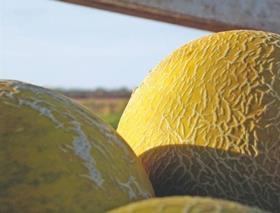
An improvement in the quality of Brazilian melons is driving sales in the UK and keeping prices buoyant, according to Terry Watts, managing director of Dartford-based importer Vidafresh.
Speaking to Fruitnet, he said the four-year drought in Brazil’s main melon growing region was forcing companies to find new production areas with access to water in order to maintain continuity of supply. “While this has impacted on their costs it has had a positive effect on fruit quality,” Watts said.
Describing eating quality as the key to developing sales within the category, he claimed the company’s ongoing trials of new varieties with its selected grower-partners continued to deliver improvements for consumers.
“No matter how a fruit is presented, if consumers don’t like it they won’t buy it – it’s all about consumer satisfaction and that is our main focus,” he said.
Vidafresh is the UK’s largest importer of Brazilian and Central American melons and one of only a handful of players in the winter melon market, a fact that Watts credits for the category’s consistent performance.
“I would say the melon category has performed well considering how challenging it is in the High Street,” Watts noted.
By contrast, prices on the European winter melon market have plummeted in recent weeks due to excess volumes and a lack of coordination among importers and exporters. Describing the situation as “a complete and unmitigated disaster”, Watts claimed too much fruit in too many hands was the main reason for the low prices.
“While there are a number of good, professional Dutch melon importers, there are also far too many speculators involved in this current Brazilian season and they are all dealing with the same exporters,” he said.
Watts noted that independent growers in Brazil were exacerbating the problem because they did not have a cohesive marketing strategy in place for the Continental sales.
“There needs to be a consolidation of importers to put some level of control and stabilisation back in the market because our industry is no different to any other – it’s all about supply and demand,” he said, adding that the situation 'could have been much worse had it not been for the mild weather, which has helped stimulate demand'.
Adriana Prado of leading supplier Itaueira said the huge volume of melons has created high stock levels, with fruit quality suffering the longer it is left in storage.
“Fortunately, as we deal with the premium market, our prices are holding up a little better, while the exchange rate has prevented this season from being a complete disaster,” she said.
Meanwhile, planting is just getting underway in Central America, where Watts said recent rainfall would likely lead mean the season starting around a week later than usual. Although there has been speculation that production will be down this year, he is confident that volumes will be maintained.
“Having recently visited many farms in the region I anticipate the same volume as last season but with a firm focus on quality because last season’s quality was poor which resulted in growers and importers alike suffering badly,” he said.
Vidafresh is about to start its second season importing melons from the Dominican Republic and Watts said the company continues to search for new supply sources “to strengthen our established, wide and diverse grower base to meet the demands and expectations of our expanding client base”.
Meanwhile, Vidafresh continues to develop its pineapple and citrus business supplying leading retailers and fresh-cut companies in the UK. The company recently opened an office at distribution company Turners (Soham) Ltd in Suffolk where its technical and quality assurance team is now based.



